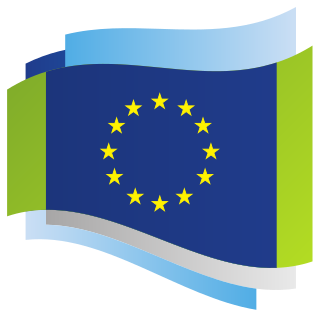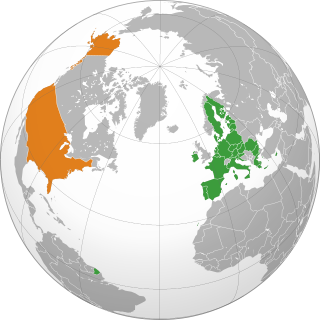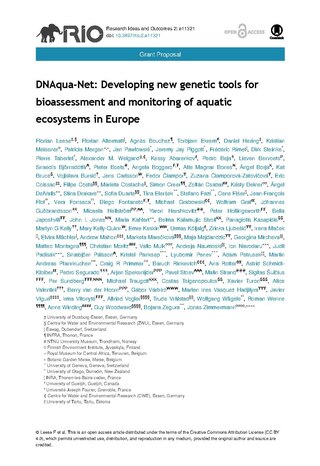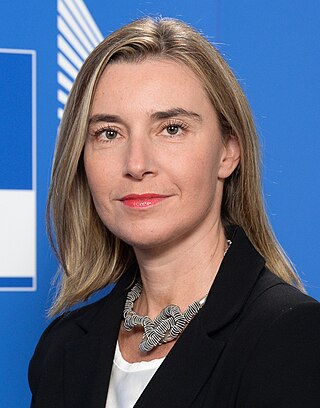
The North Atlantic Treaty Organization, also called the North Atlantic Alliance, is an intergovernmental military alliance between 31 member states – 29 European and two North American. Established in the aftermath of World War II, the organization implemented the North Atlantic Treaty, signed in Washington, D.C., on 4 April 1949. NATO is a collective security system: its independent member states agree to defend each other against attacks by third parties. During the Cold War, NATO operated as a check on the threat posed by the Soviet Union. The alliance remained in place after the dissolution of the Soviet Union and the Warsaw Pact, and has been involved in military operations in the Balkans, the Middle East, South Asia, and Africa. The organization's motto is animus in consulendo liber.

The Euro-Atlantic Partnership Council (EAPC) is a post–Cold War, North Atlantic Treaty Organization (NATO) institution. The EAPC is a multilateral forum created to improve relations between NATO and non-NATO countries in Europe and Central Asia. States meet to cooperate and discuss political and security issues. It was formed on 29 May 1997 at a Ministers’ meeting held in Sintra, Portugal, as the successor to the North Atlantic Cooperation Council (NACC), which was created in 1991.

Francisco Javier Solana de Madariaga is a Spanish physicist and PSOE politician. After serving in the Spanish government as Foreign Affairs Minister under Felipe González (1992–1995) and as the Secretary General of NATO (1995–1999), leading the alliance during Operation Allied Force, he was appointed the European Union's High Representative for Common Foreign and Security Policy, Secretary General of the Council of the European Union and Secretary-General of the Western European Union and held these posts from October 1999 until December 2009.
European integration is the process of industrial, economic, political, legal, social, and cultural integration of states wholly or partially in Europe or nearby. European integration has primarily come about through the European Union and its policies.

The European Defence Agency (EDA) is an agency of the European Union (EU) that promotes and facilitates integration between member states within the EU's Common Security and Defence Policy (CSDP). The EDA is headed by the EU High Representative for Foreign Affairs and Security Policy, European Commission’s Vice President (HR/VP), and reports to the Council. The EDA was established on 12 July 2004 and is based in Brussels, Belgium, along with a number of other CSDP bodies.

Othmar Karas is an Austrian politician who has been serving as the First Vice-President of the European Parliament since January 2022, having been a Member of the European Parliament (MEP) since 1999. He is a member of the Austrian People's Party (ÖVP), which in turn affiliates with the European People's Party.

Founded in 1955, the NATO Parliamentary Assembly serves as the consultative interparliamentary organisation for the North Atlantic Alliance. Its current President is Joëlle Garriaud-Maylam from France, elected in 2022. Its current Secretary General is Ruxandra Popa, who has been in this position since January 2020.

Russia–European Union relations are the international relations between the European Union (EU) and Russia. Russia borders five EU member states: Estonia, Finland, Latvia, Lithuania and Poland; the Russian exclave of Kaliningrad is surrounded by EU members. Until the radical breakdown of relations following the 2022 Russian invasion of Ukraine, the EU was Russia's largest trading partner and Russia had a significant role in the European energy sector. Due to the 2022 Russian invasion of Ukraine, relations became very tense after the European Union imposed sanctions against Russia. Russia placed all member state of the European Union on a list of "unfriendly countries", along with Taiwan, Japan, South Korea, Singapore, the United States, NATO members, Canada, Australia, New Zealand, Norway, Switzerland, Micronesia and Ukraine.

Relations between the European Union and the United States began in 1953, when US diplomats visited the European Coal and Steel Community in addition to the national governments of its six founding countries. The two parties share a good relationship which is strengthened by NATO, cooperation on trade, and shared values.

The European Cooperation in Science and Technology is running an EU-funded programme which enables researchers and innovators to set-up their own research networks in a wide range of scientific topics, called COST Actions. While COST does not fund research activities as such, it provides funding for scientific collaboration in the form of conferences, meetings, training schools and scientific exchanges.

The European University at Saint Petersburg, sometimes referred to as EUSP, is a non-state graduate university located in Saint Petersburg, Russia. It was founded in 1994.

Poland–Ukraine relations revived on an international basis soon after Ukraine gained independence from the Soviet Union in 1991. Various controversies from the shared history of the two countries' peoples occasionally resurface in Polish–Ukrainian relations, but they tend not to have a major influence on the bilateral relations of Poland and Ukraine.

Roderich Kiesewetter is a former Bundeswehr general staff officer and politician of the Christian Democratic Union (CDU) who has been serving as a member of the German Bundestag since 2009.

Kumiko Haba is a Japanese Professor of International Politics at Aoyama Gakuin University in Tokyo. Her research is International Relations, International Politics, International Sociology, Power Shift and National Anxiety, Immigrants-Refugee questions, Nationalism and Xenophobia in the European Union. She wrote a book, Division and Integration in Europe, Nationalism and Border in the Enlarged EU—Inclusion or Exclusion, Chuokoronshinsya, 2016.

Monika Panayotova is a Doctor of Political Science, with interests in the field of the EU security and defence policy. Bulgarian politician – Monika Panayotova has been appointed as Deputy Minister for the Bulgarian Presidency of the Council of the EU 2018, responsible for the relations with the European Parliament during the Bulgaria's presidency since June 28, 2017.

Knut Fleckenstein is a German politician and former Member of the European Parliament (MEP) from Germany. He is a member of the Social Democratic Party of Germany, part of the Party of European Socialists.

Ingrida Šimonytė is a Lithuanian politician, public servant and economist who is the 17th and current prime minister of the Republic of Lithuania since 11 December 2020. She has been a Member of the Seimas for the Antakalnis constituency since 2016 and was Minister of Finance in the second Kubilius cabinet from 2009 until 2012. Šimonytė was a candidate in the 2019 presidential election, but lost in the second round runoff to Gitanas Nausėda. She has been a member of Homeland Union since 2022, having previously been an independent politician.

Federica Mogherini is an Italian politician who served as High Representative of the Union for Foreign Affairs and Security Policy and Vice-President of the European Commission from 2014 to 2019. She previously served as Italy's Minister for Foreign Affairs and International Cooperation from February 2014 to October 2014, in the centre-left Renzi Cabinet. She was a Member of the Chamber of Deputies (MP) from 2008 to 2014. In 2020 she was appointed rector of the College of Europe, a post-graduate university for European studies in Bruges (Belgium) and Natolin (Poland).

Petras Auštrevičius is a Lithuanian liberal politician, diplomat, civil society activist, former member of Seimas, and since 2014, a member of the European Parliament.



















